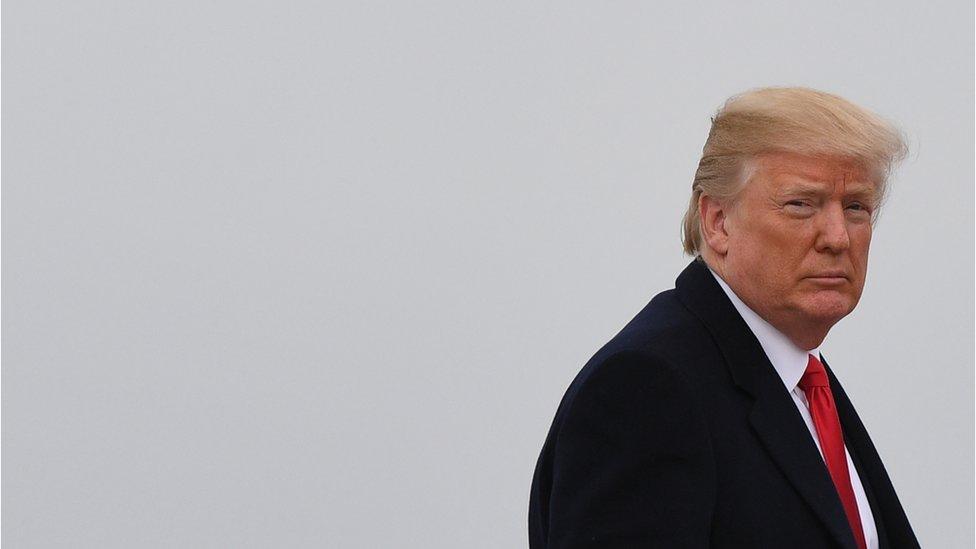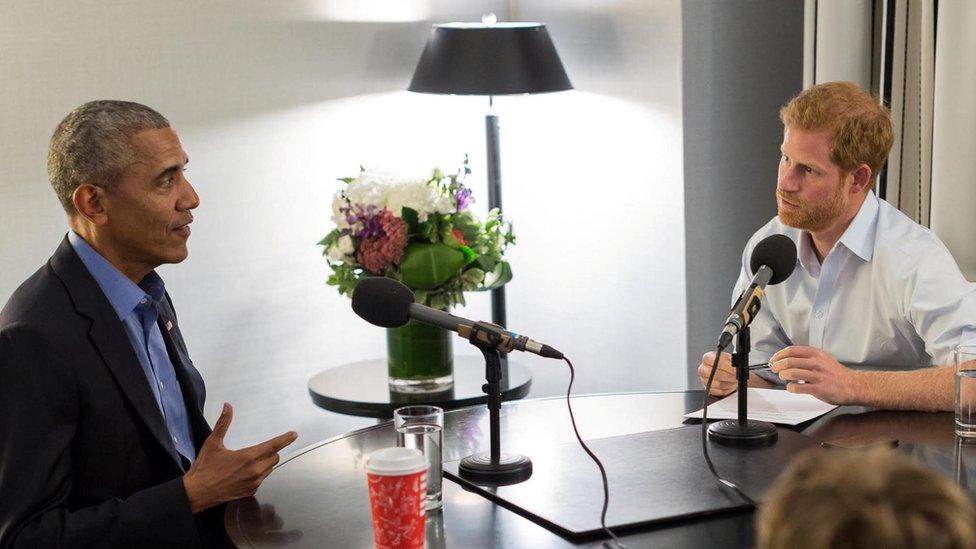Trump’s daily schedule v Obama and Bush
- Published

Mr Trump has three hours of unscheduled "Executive Time" every morning, according to report
US President Donald Trump is under fire for the length of his daily schedule, but he would not be the first commander-in-chief to forgo a nine-to-five routine.
Mr Trump takes his first meeting of the day at 11:00 after three hours of "Executive Time", according to a White House schedule leaked to news site Axios, external.
This is largely designed to accommodate the time that he spends in the White House residence watching TV and tweeting, according to the report.
The White House responded that Mr Trump spends this time making important calls and consistently "puts in long hours and long days nearly every day of the week all year long".
The Axios report highlights a long-standing criticism that Mr Trump spends too much time in front of the television.
What is Trump's usual schedule?
The schedule released to Axios differs from schedules the White House sends to the media every day.
According to the report, the president has designated "Executive Time" from 8:00 to 11:00 in the Oval Office, but actually spends these hours in his residence watching television, making phone calls and tweeting.
At about 11:00, the president emerges for his first meeting of the day, which is typically an intelligence briefing.
During the day he has a couple of meetings, with several breaks of "Executive Time" interspersed, and returns to the residence at about 18:00, says Axios.
According to the report, this unscheduled "Executive Time" during the work day is spent in the dining room next to the Oval Office where the president watches cable news.
In one example Axios presented, the president's schedule began at 11:00 with "Policy Time", then "Executive Time" at 12:00, an hour for lunch, followed by more "Executive Time" from 13:30.
The president's daily schedule has changed over the duration of his first year in office, according to the report.
At the beginning of his tenure, it is said he would hold breakfast meetings in the Roosevelt Room, but he has since pushed the start of his day back later and later as his first year in office has progressed.
On days when the president is travelling, his schedule often runs longer.
How early have other presidents started?
Many other presidents were known to have kept erratic schedules and most tailored their daily itineraries to suit their own needs.
Barack Obama began his days at about 9:00 or 10:00 after a daily morning exercise routine and always made it back to the residence to have dinner with his family, according to Matthew Dallek, a professor at George Washington University.
In contrast, George W Bush tended to get to the Oval Office by 06:45, according to the Axios report.
However, while Mr Bush was known for starting and sleeping early, Mr Obama had "night owl" habits and was known sometimes to stay up until 01:00 or 02:00 working after his family was asleep, Professor Dallek told the BBC.
Other presidents, like both Lyndon B Johnson and Bill Clinton, were known to make calls in the middle of the night.
The main difference, Professor Dallek said, citing recent reports questioning Mr Trump's mental health, is that Mr Trump's reported schedule could be detrimental to his ability to govern effectively.
"There's a chaos that this schedule reflects and breathes and encourages," he said.
Ronald Reagan worked a shorter day towards the end of his presidency, according to the academic.
In his last couple of years in office, the president was said to have appeared divorced from policy details and occasionally dozed off in meetings.
Mr Reagan was diagnosed with Alzheimer's five years after he left office.
Is Trump productive with his time?
Unlike Mr Reagan, who had to "slow down" at the end of his presidency, Mr Trump shows no signs of slackening the pace.
Tweets are sent from his account in the early hours of the morning and late at night.
White House Press Secretary Sarah Sanders responded to the Axios report with a statement defending the president's work ethic:
"The time in the morning is a mix of residence time and Oval Office time, but he always has calls with staff, Hill members, cabinet members and foreign leaders during this time. The President is one of the hardest workers I've ever seen and puts in long hours and long days nearly every day of the week all year long. It has been noted by reporters many times that they wish he would slow down because they sometimes have trouble keeping up with him."
Allow X content?
This article contains content provided by X. We ask for your permission before anything is loaded, as they may be using cookies and other technologies. You may want to read X’s cookie policy, external and privacy policy, external before accepting. To view this content choose ‘accept and continue’.
The problem, Professor Dallek said, is that for the president, "unstructured time can be destructive and debilitating", citing his tweets.
"In terms of leading the country, presidents run into dangers when they freelance," he said. "Words can be taken as policy and create a lot of chaos."
The academic said Mr Trump, who is known for airing grievances, would not be the first commander-in-chief to obsess over critics.
During the Vietnam War, according to Professor Dallek, President Johnson became obsessed with defending himself and would call aides in the middle of the night.
And some US presidents who put in a lot of hours, such as Jimmy Carter, were not always renowned for delivering results.
Mr Carter was a micromanager who was known as both extremely intelligent and very hard-working.
But he had trouble managing and delegating, according to Professor Dallek.
- Published27 December 2017
